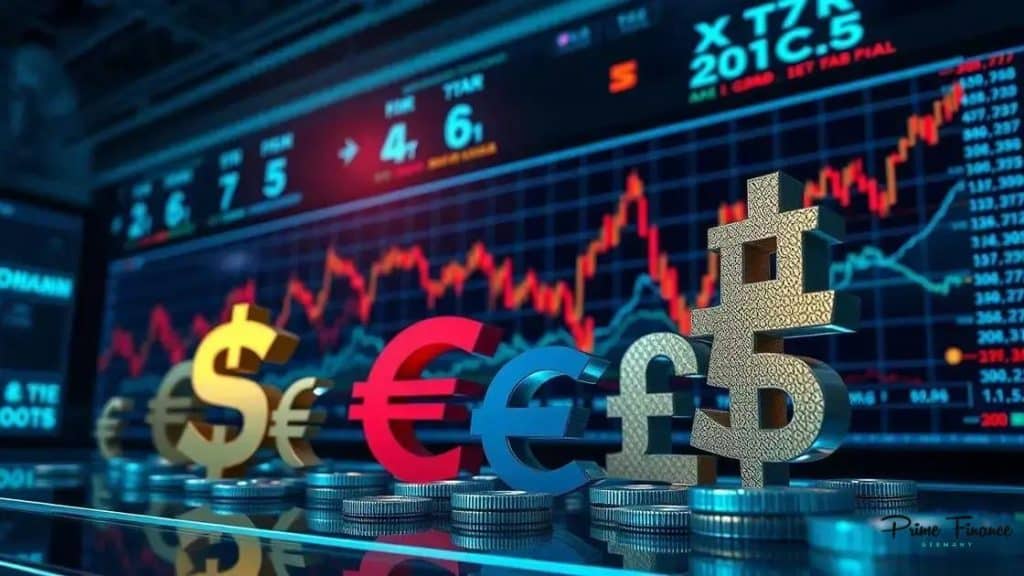The effects of trade wars on foreign exchange markets

The effects of trade wars on foreign exchange markets include currency fluctuations driven by tariffs, altering investor behavior, and reshaping global trade relationships.
The effects of trade wars on foreign exchange markets are far-reaching, impacting everything from currency values to global investor confidence. But how do these wars shape the financial landscape? Let’s dive into the implications.
Understanding trade wars and their mechanisms
Understanding trade wars is essential to grasping their impact on global economies. At their core, trade wars occur when countries impose tariffs or quotas on each other’s goods. This retaliation can disrupt trade flows, affecting currencies and market stability.
When analyzing the mechanisms of trade wars, we find several critical aspects. Two of these aspects particularly stand out: tariffs and trade barriers. By understanding these components, we can see how trade wars escalate and influence foreign exchange markets.
Tariffs: A Key Component
Tariffs are taxes imposed on imported goods, making them more expensive compared to local products. As a result, consumers may opt for domestic goods. This change can affect currency values, as nations with stronger domestic production may see their currencies rise.
Trade Barriers
Trade barriers can take various forms, including quotas, embargoes, and import licenses. These restrictions often lead to reduced trade volume and create volatility in foreign exchange markets. As the global market reacts, investors must adapt to fluctuating currency values.
Understanding these trade mechanisms is pivotal for investors. Unforeseen developments can lead to rapid market changes. It’s crucial for stakeholders to stay informed about potential trade disputes and their implications for currency fluctuation.
- Tariffs raise prices on imported goods.
- Trade barriers lead to reduced international trade.
- Market volatility arises from geopolitical tensions.
- Currency fluctuation affects international investments.
As we explore more about trade wars, it is evident that these conflicts have ripple effects across the globe. They reshape relationships between countries, leading to long-term repercussions on economies and foreign exchange rates.
Impact on currency values during trade disputes

The impact on currency values during trade disputes is significant and complex. When countries engage in trade wars, currency fluctuations often follow as a natural response to the changing economic landscape. Investors and traders closely monitor these shifts, making informed decisions based on the evolving situation.
One major factor influencing currency values is the imposition of tariffs. For instance, when a country raises tariffs on imports, the affected nation’s currency can weaken. This happens because foreign goods become more expensive, reducing demand and affecting the balance of trade.
Economic Indicators
In addition to tariffs, economic indicators play a crucial role in determining currency values. Some of these include:
- Inflation rates
- Interest rates
- Gross Domestic Product (GDP)
- Employment statistics
As these indicators change, they influence investor confidence, which in turn affects currency strength. For example, if a country shows strong economic growth, its currency may appreciate as foreign investors seek to invest.
Market Reactions
Market reactions to trade disputes can be swift. The uncertainty surrounding negotiations and the potential for escalating tensions often leads to temporary instability in currency values. Traders respond rapidly to news, leading to volatility that can create opportunities or risks.
As we analyze the impact on currency values, it becomes clear that understanding these dynamics is essential for navigating the financial landscape. The interplay between trade disputes and currency can create both challenges and opportunities for investors.
Investor behavior amidst trade uncertainties
Investor behavior amidst trade uncertainties can fluctuate significantly. When trade tensions rise, investors often feel nervous, leading to changes in their strategies. Understanding how these uncertainties affect investment decisions is crucial.
Many investors react by seeking more stable assets. In times of trade conflict, commodities like gold or government bonds often attract attention. Investors tend to believe these items will hold value despite market turbulence, resulting in a migration of funds.
Shifting Investment Strategies
Investors may alter their portfolios, moving away from stocks tied to affected sectors, such as technology or manufacturing. During trade disputes, these sectors often experience increased volatility.
- Prioritizing safer investments over riskier ones.
- Monitoring news closely for updates on trade negotiations.
- Rebalancing portfolios to mitigate risks.
- Exploring opportunities in foreign markets with lower exposure to trade disputes.
As uncertainties persist, the market can become more reactive. Even minor news related to trade disputes can cause significant swings in stock prices. The fear of losing investments can lead to rushed decisions, making it essential for investors to stay informed and patient.
Long-Term Perspectives
While short-term reactions may dominate, some investors choose to focus on long-term strategies. They may believe that trade disputes will eventually resolve, resulting in market stabilization. This longer outlook can help them avoid knee-jerk reactions to daily market fluctuations caused by news surrounding trade conflicts.
Ultimately, understanding investor behavior amidst trade uncertainties helps market participants navigate challenging times. A keen eye on trends and a strategic approach can lead to better investment decisions, regardless of the climate.
Long-term effects on global trade relations
The long-term effects on global trade relations are profound. As countries engage in trade wars, the consequences are not just immediate; they can reshape economic landscapes for years to come. Understanding these impacts is essential for businesses and investors alike.
One significant effect is the potential for shifting alliances. Countries may seek new trade partners or strengthen existing ties to mitigate the impact of tariffs. This shifting landscape can lead to the reconfiguration of global supply chains.
Impact on Supply Chains
As nations adjust their trading partnerships, global supply chains may become more complex. Companies might look for alternative sources of materials or shift production to regions with lower tariffs. This change can affect
- Production costs
- Delivery times
- Market competitiveness
- Consumer prices
The more interconnected the world becomes, the greater the impact of these shifts. Businesses must remain adaptable to navigate these evolving trade dynamics.
Regulatory Changes
Trade disputes can lead to increased regulatory scrutiny. Countries may impose stricter regulations to control imports and protect local industries. This regulatory environment can impact how businesses operate internationally.
The long-term repercussions may also involve shifts in global economic power. Countries that adapt quickly to new trade norms might emerge stronger, while those that fall behind may struggle economically. Investors need to be aware of these changing dynamics to make informed decisions.
In essence, the long-term effects on global trade relations shape the economic landscape. The ripple effects of trade wars are far-reaching, influencing everything from local markets to international economies, making it essential to stay informed.
Strategies for navigating currency fluctuations
Strategies for navigating currency fluctuations are essential for investors and businesses alike. As exchange rates can change rapidly due to various factors, having a solid plan helps mitigate risks and seize opportunities.
One of the most effective strategies is to diversify your investments. By spreading investments across different currencies and regions, you can reduce the impact of currency swings. This approach balances losses in one currency with gains in another.
Hedging Techniques
Another strategy involves hedging. Hedging refers to using financial instruments to protect against currency risks. Some common techniques include:
- Forward contracts: Agreements to exchange currencies at a specified rate in the future.
- Options: Contracts that give the right, but not the obligation, to buy or sell currency at a predetermined price.
- Currency swaps: Agreements to exchange principal and interest payments in one currency for those in another.
These tools can provide a safety net against adverse currency movements and allow for more confident investment decisions. It’s important to understand how each technique works before implementation, as they come with their own risks.
Staying Informed
Regularly monitoring the economic indicators is crucial. Key factors such as interest rates, inflation, and political stability can significantly influence currency values. Staying updated on these indicators helps in forecasting potential fluctuations.
Engaging with financial news and expert analyses can also provide insights into market trends. By understanding the broader economic context, you can make timely decisions that align with currency movements.
Investors should also consider adjusting their strategies based on market conditions. Being adaptable is vital in navigating the complex world of currency fluctuations. With the right strategies in place, you can effectively manage risks while maximizing returns in a volatile environment.
FAQ – Frequently Asked Questions about the effects of trade wars on foreign exchange markets
How can trade wars affect currency values?
Trade wars can lead to increased tariffs, which often weaken the affected country’s currency as imports become more expensive and trade balances are disrupted.
What strategies can I use to manage currency fluctuations?
Diversification of investments and using hedging techniques, like forward contracts and options, can help manage risks associated with currency fluctuations.
Why is it important to stay informed about global trade relations?
Staying informed allows investors to anticipate market changes and adapt their strategies accordingly, ensuring better decision-making in a volatile environment.
What are the long-term effects of trade disputes on economic growth?
Long-term effects may include shifting trade alliances, altered supply chains, and changes in regulatory environments, all of which can significantly impact economic growth and investor behavior.





